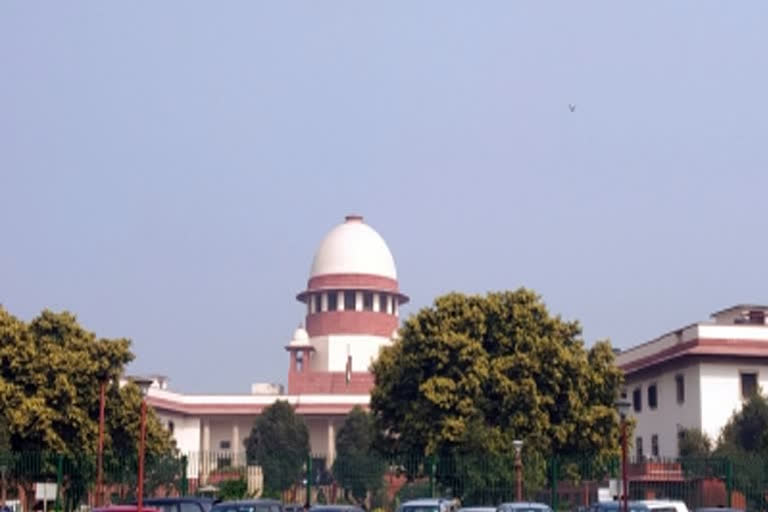New Delhi:The Supreme Court on Wednesday said its power to punish for contempt is a constitutional power which cannot be abridged or taken away even by legislative enactment as it held the chairperson of an NGO guilty of contempt for not depositing Rs 25 lakh for "scandalising and browbeating" the court.
Refusing to back off, a bench of Justices Sanjay Kishan Kaul and M M Sundresh said the chairperson of NGO Suraz India Trust, Rajiv Daiya is clearly guilty of contempt of this court and his actions to scandalise the court cannot be countenanced.
The top court also said the raison d'etre (reason or justification for being or existence) of contempt jurisdiction is to maintain the dignity of the institution of judicial forums. It issued notice to Daiya and directed him to be present on October 7 for hearing of the quantum of sentence.
The court had earlier rapped the NGO for wasting judicial time after it filed 64 petitions over the years under the garb of a PIL without a single success. "The power to punish for contempt is a constitutional power vested in this court which cannot be abridged or taken away even by legislative enactment.
"We have little doubt that what the contemnor has been endeavouring is to have his way or, alternatively, I will throw mud at all and sundry, whether it be the Court, its administrative staff or the State Government so that people, apprehensive of this mud thrown, may back off. We refuse to back off and are clear in our view that we must take it to its logical conclusion," the court said.
Read: Court adjourns hearing on plea seeking action against Rahul Gandhi
"It is not a vindictive exercise nor are inappropriate statements by themselves capable of lowering the dignity of a Judge. These are often ignored but where despite all latitude a perennial litigant seeks to justify his existence by throwing mud at all and sundry, the court has to step in."
Elaborating on the powers with the top court, the bench said as per Article 129, the apex court being a Court of Record shall have all the powers of such a Court of Record including the power to punish for contempt of itself. The apex court said Daiya continues with his contumacious behaviour and the apologies submitted by him are only endeavours to get out of the consequences again followed by another set of allegations, "thus, a charade".
It said that his last apology can hardly be called an apology seeing the contents and there is no remorse on the part of the contemnor. "This court has held that an apology cannot be a defence, a justification can be accepted if it can be ignored without compromising the dignity of the court." The top court said there is no absolute licence when appearing in person to indulge in making aspersions as a tendency to scandalise the Court in relation to judicial matters.
It also cautioned against motivated and calculated attempts to bring down the image of the judiciary in the estimation of the public and impair the administration of justice. "In the current context if seen, the grievance arises on account of the inability of the contemnor to file public interest petitions on account of costs being imposed, which he claims to be unable to pay and the consequences thereof of not being able to prosecute his petitions, which are large in number.
"The contemnor has apparently made a profession of filing public interest petitions on subjects of which he may not know much and then seeking to scandalise the Court to grant him relief failing which he will continue to scandalise the court," the court said. The top court had issued contempt notice to Daiya as to why he should not be proceeded against and sentenced for his endeavour to scandalise the court. Daiya had told the bench that he did not have the resources to pay the costs imposed by the apex court and would approach the President of India with a mercy plea.
Read: DRDO espionage case: Odisha Police seek Interpol help
The top court on December 5, 2017, had refused to modify its earlier order against the NGO for filing 64 PILs. It had dismissed the plea filed by the NGO to modify the apex court's May 1 order which also barred the organisation from filing any plea before any court across the country.
Since the costs were not deposited with the Supreme Court Advocates on Record Welfare Trust, the matter was put up again before the apex court and notice was issued on September 29, last year. With regard to the recovery of money, the bench on Wednesday said it can take place as arrears of land revenue. The top court had earlier issued direction to the NGO to disclose the movable and immovable assets of the petitioner which was not complied with.
It had on May 1, 2017 taken the punitive step and imposed a hefty cost on the NGO, saying waste of judicial time was a matter of serious concern. The court had also said such practices have to be dealt with sternly to prevent misuse of the courts by such individuals "who have nothing to do but only cast scandalous and imaginary aspersions".
Referring to the details of the matters filed by the NGO and the various orders passed by the apex court, the bench headed by the then Chief Justice J S Khehar had said it "leaves no doubt that Suraz India Trust has repeatedly misused the jurisdiction of this court".
PTI
